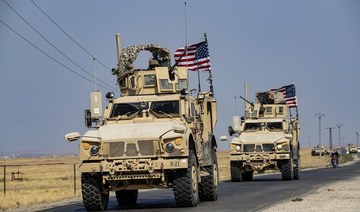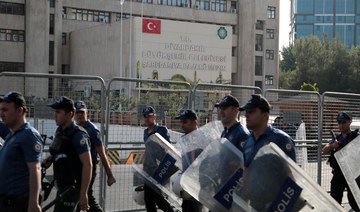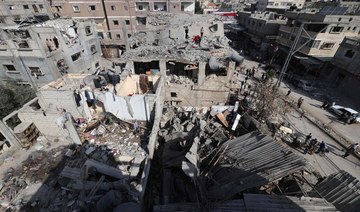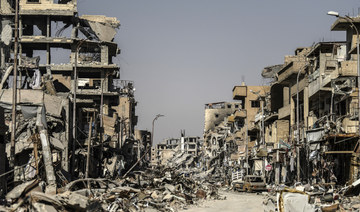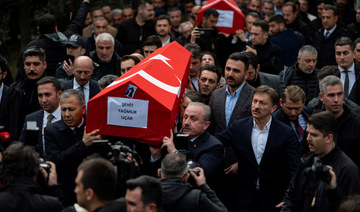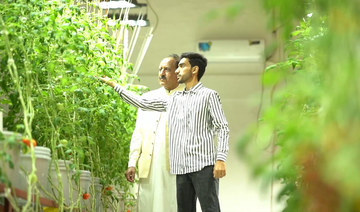ISTANBUL: The Turkish military released 18 Syrian government soldiers captured in northeastern Syria by its forces, the Syrian Observatory for Human Rights said Thursday.
Turkish Defense Minister Hulusi Akar said earlier that the soldiers were captured during Turkish reconnaissance operations southeast of Ras Al-Ayn but didn’t say when.
Turkey agreed to a cease-fire brokered by Russia in which Kurdish fighters would withdraw 30 kilometers (19 miles) away from the Turkish border. As part of the deal, Syrian government forces would take positions along the frontier.
Akar spoke during a visit to Turkish troops at the border with Syria. His comments were carried on the official ministry website.
A Syrian Kurdish official said the soldiers were captured Tuesday during an intense battle between Syrian government forces and Turkey-backed fighters. Kurdish fighters were fighting alongside the Syrian troops. The official spoke on condition of anonymity because he was not authorized to brief reporters.
In another sign of the changing battleground, US forces said the first batch of mechanized armored vehicles arrived in southeast Syria on Thursday, where they are to take part in securing oil fields and fighting remnants of Daesh. US-led Coalition spokesman Col. Myles Caggins said the first batch of Bradley armored infantry carriers arrived in Deir Ezzor Province and will provide infantry with maneuverability and firepower. He said the deployment is “de-conflicted” with other forces operating in the region.
The province is home to some of Syria’s largest oil fields. It is also where Daesh militants continue to wage an insurgency and where they lost their last territory in March.
US President Donald Trump ordered the troop withdrawal from the north ahead of a Turkish military offensive there earlier this month. He said he wanted out of America’s “endless wars” but would leave US troops in the region to secure oil facilities.
Turkey is pushing to have Kurdish fighters moved away from its borders. Ankara views the Syrian Kurdish fighters as an extension of the decades-long Kurdish insurgency in southeastern Turkey. But Washington has partnered with those Kurdish-led forces to fight Daesh over the last five years, putting in a difficult spot between its NATO ally and battleground partners.
The Kurdish forces leaned on Russia and the Syrian government to protect them against the advancing Turkish forces. But Turkey seized a stretch of land across the border before the US negotiated an initial cease-fire.
Turkey has offered financial and logistical backing for the Syrian opposition that worked to bring the government of President Bashar Assad down. Ankara has also carried out three military operations into Syria and now controls territory in northwest and northeast Syria to push Daesh militants and Kurdish fighters away from its borders.
Turkey then agreed to a cease-fire brokered by Russia on Oct. 22, under which Kurdish fighters would withdraw to 30 kilometers (19 miles) away from the Turkish border. Under the deal, Syrian government forces would take positions along the frontier and joint Turkish-Russian patrols are due to begin Friday.
But the truce has been marred by accusation of violations from both sides.
For days now, Turkey-allied fighters have been fighting Kurdish forces near Abu Rasein, a village between Ras Al-Ayn and Tal Tamr, despite the deployment of Syrian government forces. Syrian state media also reported some government soldiers clashed with the Turkey-backed forces.
The Kurdish official said the Syrian government soldiers were captured in the area. He said the forces then withdrew after their soldiers were captured.
A war monitor group, the Syrian Observatory for Human Rights, also reported that Syrian troops pulled out from the Tal Tamr area on Wednesday, amid a Turkish-backed advance with air cover. The area is home to Syria’s dwindling Christian Assyrian community. The commander of the Kurdish-led Syrian Democratic Forces, Mazloum Abdi, warned that Turkey-backed fighters began entering Christian villages and are attempting to break into the main town.
The Syrian withdrawal left empty the border post in Darbasiyeh, west of Ras Al-Ayn, which Kurdish forces had handed over just days before, according to the Rojava Information Center, an activist group. Later on Thursday, the Observatory said government and Kurdish forces were deploying into the town of Tal Tamr.
Separately, a car bomb went off in a town administered by Turkey-backed forces in northwestern Syria, killing at least eight people.
Turkey’s official Anadolu news agency said another 14 people were wounded in the attack in a vegetable market in Afrin. It said the explosives were packed into a refrigerator truck.
Turkish-led forces captured Afrin from Syrian Kurdish fighters early last year. The area is controlled by Syrian fighters allied with Turkey, who have been accused by rights groups of seizing land and property . The area sees sporadic attacks and other violence.
Syria’s state-run SANA news agency also reported the attack, saying nine people were killed and 20 wounded. It said the blast ignited a nearby patrol station and caused damage to surrounding homes and shops.
No one has claimed the attack.
Turkey releases 18 Syrian soldiers captured in Syria
Turkey releases 18 Syrian soldiers captured in Syria
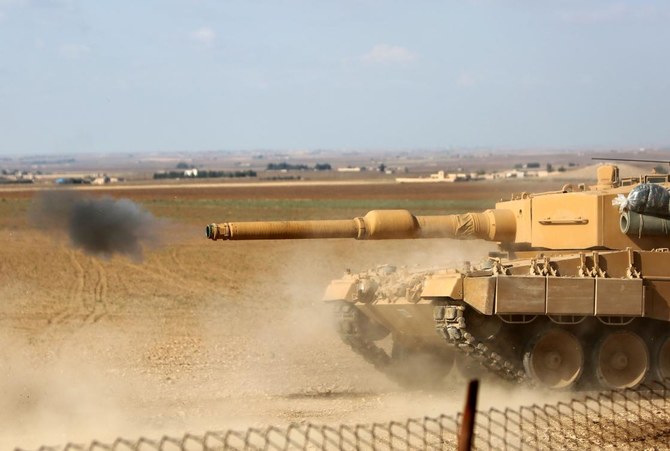
- The Syrian soldiers were released late on Thursday
- A Syrian Kurdish official said the soldiers were captured Tuesday during an intense battle between Syrian government forces and Turkey-backed fighters
Iran slaps sanctions on US, UK over Israel support
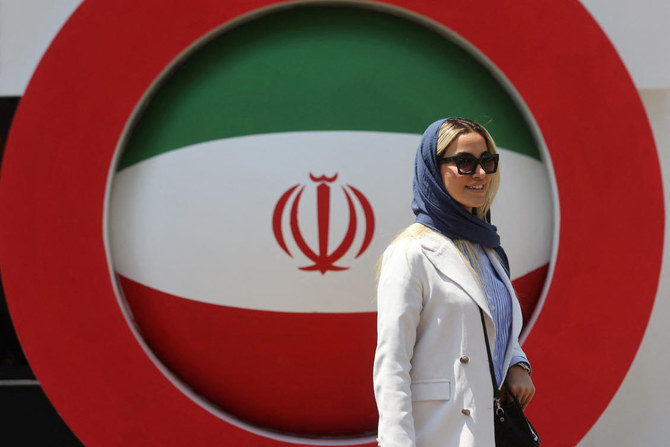
The Islamic republic, the regional arch-foe of Israel, unveiled the punitive measures in a statement from its foreign ministry.
It said the sanctions targeted seven Americans, including General Bryan P. Fenton, commander of the US special operations command, and Vice Admiral Brad Cooper, a former commander of the US Navy’s Fifth Fleet.
British officials and entities targeted include Secretary of State for Defense Grant Shapps, commander of the British army strategic command James Hockenhull and the UK Royal Navy in the Red Sea.
Penalties were also announced against US firms Lockheed Martin and Chevron and British counterparts Elbit Systems, Parker Meggitt and Rafael UK.
The ministry said the sanctions include “blocking of accounts and transactions in the Iranian financial and banking systems, blocking of assets within the jurisdiction of the Islamic Republic of Iran as well as prohibition of visa issuance and entry to the Iranian territory.”
The impact of these measures on the individuals or entities, as well as their assets or dealings with Iran, remains unclear.
The war in the Gaza Strip erupted after the October 7 attack by Palestinian militants on Israel which killed 1,170 people, mostly civilians, according an AFP tally based on official Israeli figures.
Iran backs Hamas but has denied any direct involvement in the attack.
Israel’s retaliatory offensive against Hamas has since killed at least 34,568 people in Gaza, mostly women and children, according to the Hamas-run territory’s health ministry.
12-truck UAE aid convoy enters Gaza Strip
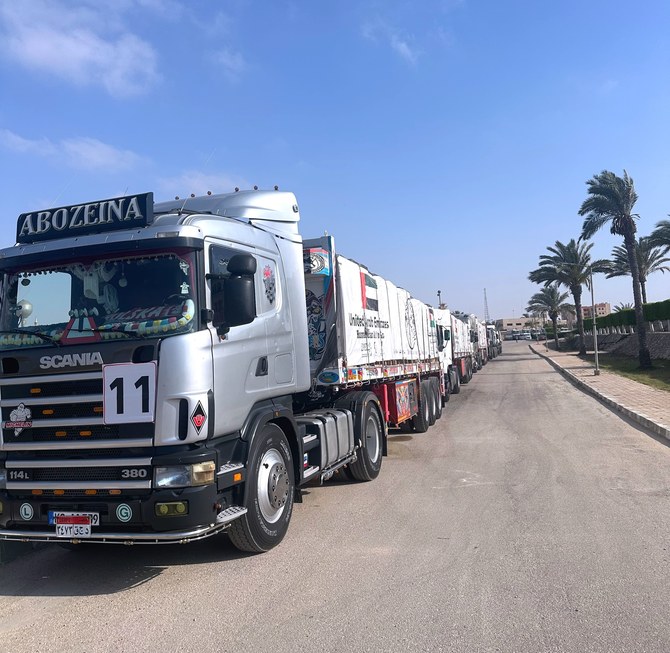
- UAE has also sent Palestinians food, water via sea, air
- Emirates has provided medical treatment for thousands
Al-ARISH: A UAE aid convoy entered the Gaza Strip on Wednesday via Egypt’s Rafah Crossing Point as a part of the country’s “Operation Chivalrous Knight 3” project to support the Palestinian people, UAE state news agency WAM reported on Thursday.
The 12-truck convoy is transporting over 264 tonnes of humanitarian aid including food, water and dates.
The latest convoy now brings to 440 the number of trucks that have been used for support efforts.
As of May 1, 2024, the UAE has now provided the Palestinians 22,436 tonnes of aid, which has included the deployment of 220 cargo planes and three cargo ships. The goods pass through Al-Arish Port and the Rafah crossing into Gaza.
These efforts are a part of the “Birds of Goodness” operation, which involves aerial drops of humanitarian supplies. By Wednesday, 43 drops have been conducted, delivering a total of 3,000 tonnes of food and relief materials to inaccessible and isolated areas in Gaza.
Since its establishment, medical staffers at the UAE’s field hospital in Gaza have treated more than 18,970 patients. An additional 152 patients were evacuated to the UAE’s Floating Hospital in Al-Arish Port, and 166 to the UAE for treatment.
The UAE has set up six desalination plants with a production capacity of 1.2 million gallons per day to support the people in Gaza.
Syrians accuse Russia of hitting hospital in new complaint filed with UN rights committee

- Moscow has repeatedly denied accusations that it violated international law in Syria
BEIRUT: A Syrian man and an aid organization have accused Russia of violating international law by deliberately bombing a hospital in northern Syria in 2019, in a new complaint filed at the United Nations Human Rights Committee this week.
Russia, which intervened militarily in Syria’s conflict in 2015 to bolster the forces of its ally President Bashar Assad, has been accused by UN investigators of committing war crimes in Syria, but has not faced any international tribunal.
Moscow has repeatedly denied accusations that it violated international law in Syria.
The new complaint, filed on May 1 but made public on Thursday, accuses Russia’s Air Force of killing two civilians in a series of air strikes on the Kafr Nobol Surgical Hospital in the northwest province of Idlib on May 5, 2019.
It was brought to the committee by the cousin of those killed and by Hand in Hand for Aid and Development, an aid group that was supporting the hospital, which was in territory held by armed groups opposed to Assad.
The complaint relies on videos, eyewitness statements and audio recordings, including correspondence between a Russian pilot and ground control about dropping munitions.
“Syrians are looking to the Human Rights Committee to show us some measure of redress by acknowledging the truth of this brutal attack, and the suffering caused,” said Fadi Al-Dairi, the director of Hand in Hand.
The Geneva-based Human Rights Committee is a body of independent experts that monitors the status of political and civil rights around the world, and can receive complaints by states and individuals on alleged violations.
Individual complaints can lead to compensation payments, investigations or other measures.
While rights groups have accused both Syria and Russia of violating international law within Syria for years, neither country is party to the International Criminal Court’s Rome Statute, and opportunities for accountability are rare.
Russia signed onto the Optional Protocol to the International Covenant on Civil and Political Rights in 1991, meaning it accepts the Human Rights Committee’s ability to consider complaints from individuals against it.
“This complaint before a preeminent international human rights tribunal exposes the Russian government and armed forces’ deliberate strategy of targeting health care in clear violation of the laws of war,” said James A. Goldston, executive director of the Justice Initiative, whose lawyers are representing the applicants.
In 2019, the UN Human Rights Commission — a separate body — said strikes on medical facilities in Syria including the Kafr Nobol hospital “strongly” suggested that “government-affiliated forces conducting these strikes are, at least partly, if not wholly, deliberately striking health facilities.”
Morocco’s farming revolution: defying drought with science
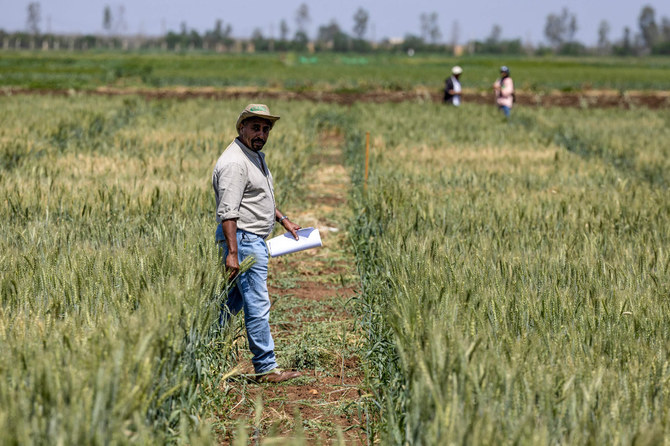
- In the face of “extremely high” water stress, Morocco's cultivated areas are expected to shrink to 2.5 million hectares drastically
- The kingdom's agricultural research agency aims to develop genotypes that not only withstand drought and heat but also yield abundantly
MARCHOUCH, Morocco: In the heart of sun-soaked Morocco, scientists are cultivating a future where tough crops defy a relentless drought, now in its sixth year.
“Look at these beautiful ears of wheat,” said Wuletaw Tadesse Degu, the head of wheat breeding at the International Center for Agricultural Research in Dry Areas (ICARDA).
“The difference in quality between our field and others is striking,” he said, pointing toward a lush expanse in Marchouch, south of Rabat, that stood in stark contrast with the barren lands elsewhere.
By 2040, Morocco is poised to face “extremely high” water stress, a dire prediction from the World Resources Institute, a non-profit research organization.
Figures from the North African country’s central bank paint a grim picture.
Cultivated areas across the kingdom are expected to shrink to 2.5 million hectares in 2024 compared with 3.7 million last year, with cereal yields more than halving to 25 million quintals (2.5 million tons) over the same period.
“It has become essential to use resilient seeds and to employ them as quickly as possible,” said Tadesse, whose center recently inaugurated a plant gene bank.

Tadesse’s mission is to develop genotypes that not only withstand drought and heat but also yield abundantly.
Last year, while the nation struggled, Marchouch achieved a yield of four tons per hectare with just 200 millimeters of rainfall.
Controlled irrigation and strategic sowing techniques are behind this agricultural revolution.
Looking to maximize production, farmers are experimenting with planting times and judicious irrigation.
Even a scant 10 millimeters of water, carefully applied, transformed barren soil into thriving fields.
Barley, too, has seen a resurgence, with yields jumping from 1.5 to two tons per hectare last year, thanks to climate-smart genotypes, said Miguel Sanchez Garcia, a barley specialist at ICARDA.
The center, which operates in 17 countries in Africa and Asia, says it has developed 30 “elite lines” of grain.
Most of them are produced in Morocco by breeding genotypes of wild wheat with different ancestors, said ICARDA genetics researcher Ahmed Amri.

Moroccan agricultural authorities approved six new wheat and barley varieties last year, but bureaucratic hurdles loom large.
Approval processes drag on, impeding the timely dissemination of new varieties to farmers, researchers at the center said, resulting in a five-year journey from approval to market-ready seeds.
“The certification system takes too long and should be revised quickly,” said Moha Ferrahi, head of genetic resources conservation and improvement at the National Institute of Agricultural Research.
Ferrahi also pointed to the lack of engagement from private companies and farmers who opt for “foreign seeds to have a quicker return on investment while these seeds are not adapted to the climate of Morocco.”
Yet many see room for improvement, even in a drought-hit country where the average citizen consumes about 200 kilogrammes of wheat per year — significantly above the world’s average, according to official figures.
“Unlike countries like Egypt or Ethiopia, Morocco has chosen to liberalize its market,” said researcher Amri, meaning that authorities have no control over what varieties farmers select.
But Amri remains convinced that, coupled with the national agricultural program, the widespread adoption of resilient varieties will help offset mounting losses.
Teenage Iranian protester Nika Shakarami ‘was killed by police’

JEDDAH: Iranian authorities ordered the arrest of activists and journalists on Wednesday after a leaked Revolutionary Guard report revealed that secret police had sexually assaulted and killed a teenage girl during Iran’s “hijab protests” in 2022.
Nika Shakarami, 16, died during demonstrations over the death in police custody of Mahsa Amini, who had been detained for wearing her headscarf incorrectly.
Shakarami’s death also sparked widespread outrage. Authorities said she died after falling from a tall building, but her mother said the girl had been beaten.
In a report prepared for the Islamic Revolutionary Guard Corps and leaked to the BBC, investigators said Shakarami had ben arrested by undercover security forces who molested her, then killed her with batons and electronic stun guns when she struggled against the attack.
Iran’s judiciary said on Wednesday that the BBC story was “a fake, incorrect and full-of-mistakes report,” without addressing any of the alleged errors.
“The Tehran Prosecutor’s Office filed a criminal case against these people,” a spokesman said, with charges including “spreading lies” and “propaganda against the system.” The first charge can carry up at a year and a half in prison and dozens of lashes, while the second can bring up to a year’s imprisonment.
It was not clear if prosecutors had charged the three BBC journalists who wrote the report. Those associated with the BBC’s Persian service have been targeted for years by Tehran and barred from working in the country since its disputed 2009 presidential election and Green Movement protests.
Iranian Interior Minister Ahmad Vahidi said the BBC report was an effort to “divert attention” from protests at American universities over the Israel-Hamas war. “The enemy and their media have resorted to false and far-fetched reports to conduct psychological operations,” he said.



